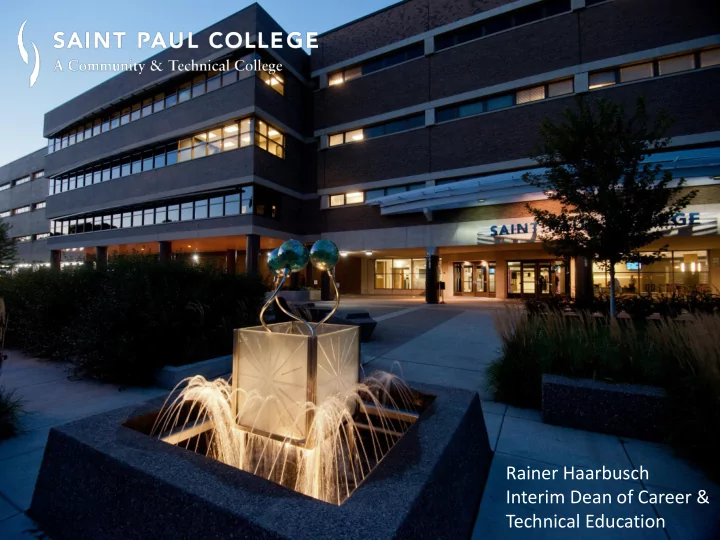

Rainer Haarbusch Interim Dean of Career & Technical Education
Education and Training Models for Minnesota’s Workforce Needs
Demographics: Trends, Projections, Challenges Age: Unprecedented growth in Minnesota’s older population (age 65+) 1990s: 47,000 2000s: 89,000 2010s: 282,000 2020s: 297,000 Source: MN-Compass Diversity: 1990: 6.3% people of color 2020: 20% people of color Source: Star Tribune
Talent Shortage: 3,100,000 jobs versus 2,700,000 adults (18-64) (2024) Qualification: More than 60% of jobs require education beyond high school Non-technical skills needed to be employable: Learning strategies – Originality – Curiosity – Creativity – Tech savvy – Contextual thinking – ... Sources: 2016 Economic Outlook: Minnesota Chamber of Commerce; MIT Technology Review
51% 63% 89% Non-traditional Students Students age students of color receiving (24+) financial aid Average age: 28
What can we learn from listening to our students?
Barriers to Access and to Success Housing Transportation Healthcare Childcare Social Connections Various non-academic barriers …
Education and Training Models need to be: Relevant, quality-driven, transferrable credentials Affordable or “Earn while you learn” Inclusive by providing wrap-around services Academic Advising Tutoring Mental Health Services Emergency Fund Referral Services …
Students in technical education programs Potential students Students in without Trade Union- access to sponsored Regular programs education or Students employment = Informal Underutilized apprenticeships workforce potential
How can Higher Education Institutions and Industry work together to help all* Minnesotans gain access to education leading to meaningful employment with family-sustaining wages? * Including those individuals who can’t access education pathways or the job market due to systemic barriers
Recommend
More recommend